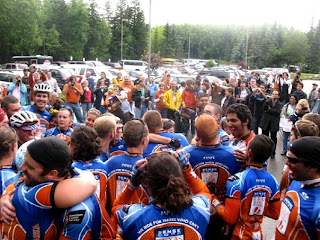
It's hard to tell, but there's rain in this photo. Ironically, that day's weather conditions brought our journey full circle, because (if you remember), our send-off in Austin was just as wet as our arrival in Anchorage.
The Texas Exes network in Austin welcomed us with an Alaskan dinner featuring halibut ceviche, grilled salmon, moose sausage, as well as various desserts and pastas. Right now, I'm sitting in the dining room of my hosts, Dora and Spencer, who also part of the UT alumni network here in Anchorage. The Olympics are on television in the background (television!), my teammate Mike is chatting on his cell phone (we finally have reception after two weeks of wilderness in the Yukon Territory and eastern Alaska), and a beautiful backyard of evergreen and (I think) poplar trees calms me.
70 days later, I'm a different person: I've reached greater peace with my mother's death, I'm more self-confident, and (I regret being so honest) 10 pounds heavier!
It might be muscle mass. I ate about 4,000-5,000 calories per day this summer and burned about 3,000. You would be appalled by the amount of food we all ate! I'm sure we scarfed down as much as an elephant would, daily. One of the challenging parts of coming back to my normal life will be exercising restraint in my diet; when biking an average of 80 miles a day, you can eat pretty much anything and everything without feeling any sense of guilt.
Beyond matters of weight, something else is different these days. But, I have a hard time in articulating the way I feel or the way my attitudes have changed. And, I don't think I could really figure out whether I have really "changed" until I get in the swing of usual life: having an hourly schedule, living in the same area for an extended period of time, working full time, and multi-tasking (as opposed to eating, biking, and sleeping again and again).
One feeling that I am nevertheless sure of is peacefulness. I went through anger, grief, and sadness as I pedalled across the north american continent thinking of my mother, her devastating illness, what life would be like if she were still here, and the millions of Americans who battle cancer and lose. My biggest emotional struggles were in dealing with the fact that I had no answers to many questions: what were Mom's mannerisms, what were hopes for me, what was she thinking about on the day she realized her illness was terminal, and what would Mom say about the person I've become?
As I pedalled downhill through valleys and canyons and uphill through various mountain passes, and as I crossed the continental divide amongst snow-capped mountains while rolling through rain, wind, and haze, asking such questions made me angrier with my loss. I began to realize the importance of acceptance and of simply not knowing. I would look to the mountains, hoping that their beauty and stoicism would help me to find the answers. I would look to the glacial rivers of Banff, hoping that the gentle sounds of streams and rushing water would whisper something in my ear—something that would tell me about the life my mother led. However, each time I looked to nature for the answers I could only pretend that my questions were being answered. My imagination would give the only reply.
Right now, I'm thinking of a 40-mile descent to Sutton, Alaska—day 69 of our journey. Alaskan tundra was on my left, red and greenish-gray mountains were above me, and I could see glaciers in the distance. I was traveling 40.2 miles per hour on a long downhill slope of 7% grade. I remember being sad about the inevitable tragedy: I am going to forget the details of these mountins, I am going to forget many similar moments from this past summer, I am going to misremember the changing highways. On that day in Sutton, however, I tried hard to ingrain that particular moment in my mind, because it was the most beautiful moment of my entire summer.
Though I might forget the way those mountains looked, I hope to remember the way they made me feel—the way the downhil descent deafened my sense of hearing, the great conversation I had with Ivan right before we started dropping in elevation, and the sense of joy I felt in thinking that my mother was a beautiful person for who she was, despite the imperfections she might have had and more so because of the life she lived.
This summer became a celebration of her life, and even though the summer's journey has ended I will continue to ride for those who can't.






